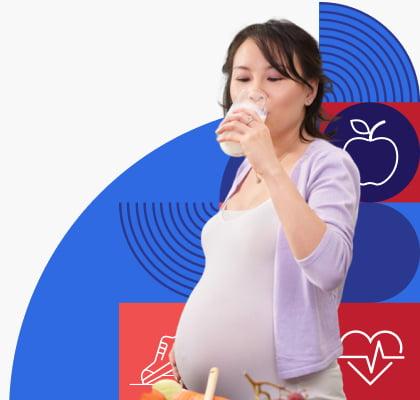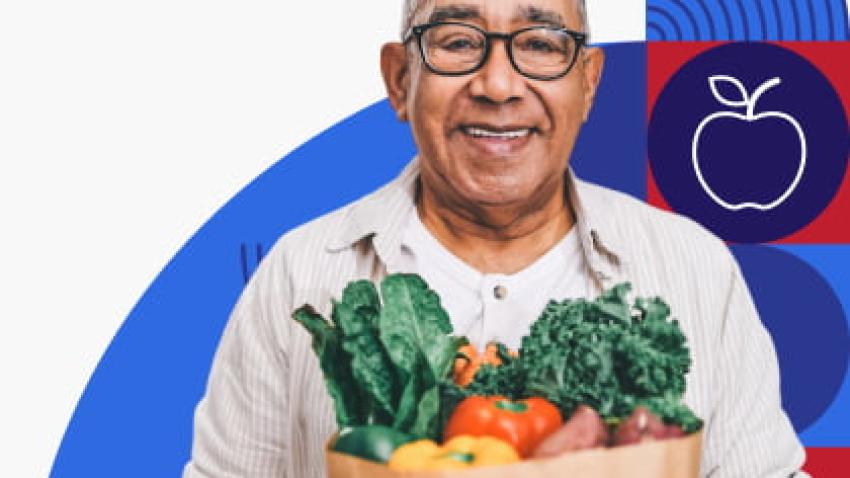Pregnancy
Eat Healthy During Pregnancy: Quick Tips

When you're pregnant, you need more of certain nutrients — like protein, iron, folic acid, iodine, and choline. It’s also important to get enough calcium, vitamin D, potassium, and fiber.
Making smart food choices can help you have a healthy pregnancy and a healthy baby. Here are some ideas to help you eat healthy during pregnancy.
Follow a healthy eating routine.
To get the nutrients you need during pregnancy, follow a healthy eating routine [PDF - 1.82 MB]. Choose a mix of healthy foods you enjoy from each food group, including:
- Whole fruits — like apples, berries, oranges, mango, and bananas
- Veggies — like broccoli, sweet potatoes, beets, okra, spinach, peppers, and jicama
- Whole grains — like brown rice, millet, oatmeal, bulgur, and whole-wheat bread
- Proteins — like lean meats and chicken, eggs, seafood, beans and lentils, nuts and seeds, and tofu
- Low-fat or fat-free dairy — like milk, yogurt, cheese, lactose-free dairy, and fortified soy beverages (soy milk) or soy yogurt
- Oils — like vegetable oil, olive oil, and oils in foods like seafood, avocado, and nuts
Learn more about eating healthy.
Get the right amount of calories for you.
How many calories you need will change throughout your pregnancy. Most women with a healthy pre-pregnancy weight have the following calorie needs:
- First trimester (first 12 weeks) — no extra calories
- Second trimester (13 to 26 weeks) — about 340 extra calories a day
- Last trimester (after 26 weeks) — about 450 extra calories a day
Weight gain is a natural part of pregnancy. How much weight is healthy to gain — and the number of extra calories you’ll need — depends on many things, including how much you weighed before pregnancy. Ask your doctor or midwife how many calories you need and how much weight is healthy for you to gain during pregnancy.
You can also create a personalized MyPlate Plan.
Make healthy snack choices.
Examples of healthy snacks include:
- Low-fat or fat-free yogurt with fruit (look for options with no added sugar)
- Whole-grain crackers with peanut butter
- Carrots with hummus
If you’re feeling sick, try eating dry toast, dry cereal, or saltines.
Take a prenatal supplement every day.
Everyone needs to take prenatal supplements (also called prenatal vitamins) during pregnancy. Talk with your doctor or nurse about a prenatal vitamin that’s right for you.
And make sure you get enough of these key nutrients:
- Folic acid helps prevent some birth defects of the brain and spine. Choose a prenatal supplement that has 400 to 800 mcg of folic acid. Learn more about getting enough folic acid.
- Iron helps your baby develop, and many women don’t get enough iron during pregnancy. Ask your doctor if you need a prenatal supplement with iron. Learn more about iron.
- Iodine is important for your baby’s brain. If you use salt at home, make sure it’s iodized salt (salt with added iodine). Prenatal supplements may not have iodine — ask your doctor whether you need an iodine supplement. Learn more about iodine.
- Choline is also important for your baby’s brain. Choose foods with choline — like low-fat and fat-free dairy, eggs, lean meats, seafood, beans, and lentils. It’s also important to note that many prenatal supplements don’t have choline. If you think you might not be getting enough choline, talk to your doctor. Learn more about choline.
Eat 8 to 12 ounces of seafood each week.
Fish and shellfish have healthy fats that are good for you and your baby. But some seafood is high in mercury, a metal that can harm your baby’s development. It’s a good idea to eat seafood that’s high in healthy fats but lower in mercury.
Learn how to choose fish that's healthy and safe to eat.
Don’t eat certain foods.
These foods may have bacteria in them that can hurt your baby. Stay away from:
- Raw (uncooked) or rare (undercooked) fish or shellfish, like sushi or raw oysters
- Raw or rare meats, poultry, or eggs
- Unpasteurized juice, milk, or cheese — make sure it says “pasteurized” on the label
- Lunch or deli meats, smoked seafood, and hot dogs — unless they’re heated until steaming hot (165 °F, or degrees Fahrenheit)
- Prepared meat or seafood salads like ham salad, chicken salad, or tuna salad
- Raw sprouts, including alfalfa, clover, radish, and mung bean sprouts
Learn more about foods to avoid during pregnancy.
Limit drinks with caffeine and added sugars.
- Drink plain water instead of sugary drinks like soda, fruit drinks, sweetened waters, and energy or sports drinks. Try adding fruit or herbs to your water for a fresh flavor.
- Ask your doctor if caffeine is safe for you. Or try decaf coffee and tea — and skip the sweeteners and cream.
Don’t drink alcohol.
No amount of alcohol is safe during pregnancy or while trying to get pregnant. All types of alcohol can be harmful for your baby, including wine and beer. Learn more about alcohol use and pregnancy.
Content last updated May 19, 2023
Reviewer Information
This information on healthy eating during pregnancy was adapted from materials from the Dietary Guidelines for Americans, the U.S. Department of Agriculture, and the Office on Women’s Health.
Reviewed by:
The U.S. Department of Health and Human Services, Office of Disease Prevention and Health Promotion.


